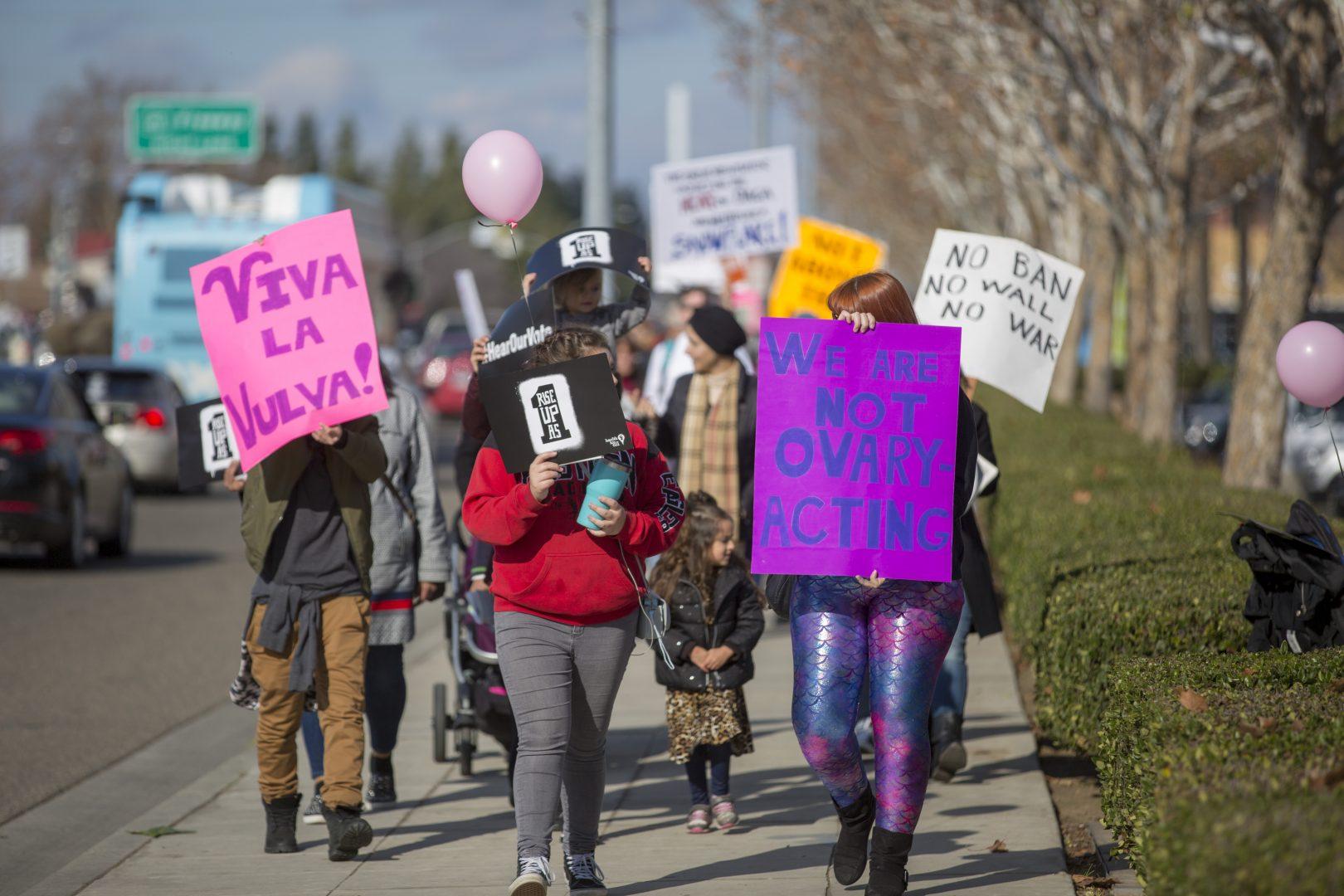The second annual Women’s March in northeast Fresno brought many walks of life together on Saturday for a nationwide demonstration supporting women’s rights. The event not only focused on issues affecting women but on social topics that have been debated recently.
With the theme of “Hear Our Vote,” thousands of Fresno residents and people from throughout the central San Joaquin Valley used the march to voice their opinions on President Donald Trump’s political actions on the one-year anniversary of his inauguration.
The event also provided a sense of hope for the future of those who attended. Speakers during a rally highlighted the importance of voting in order to progress social and political equality.
Native American, black, Sikh, Muslim, veteran, Hmong, Syrian, sexual assault survivors and Latina activists spoke of their plights and triumphs during the march.
One activist read a poem about a confession of a sexual assault victim, noting the lack of attention given to victims and modern politicians accused of sexual assault.
“He got away with it. It was the ‘60s. He got away with it. Until now. #MeToo,” she said to conclude her statement.
The hashtag “me too” began as a social media movement drawing attention to sexual assault and harassment. Members and supporters of the movement use the hashtag to tell their stories and to prevent the abuse from happening again.
The #MeToo campaign was a constant topic throughout the event. One speaker asked those in attendance to raise their hand if they had experienced sexual assault or knew someone who had.
Many hands went up.
Sophia Bautista, 19, was a younger voice on the stage during the rally. Upon learning one of her friends was protected by the Deferred Action for Childhood Arrivals (DACA) program, Bautista became focused on defending the program after it was ordered to be rescinded last September.
Bautista also got to carry the Women’s March banner with farm-worker activist Dolores Huerta, a moment she described as “surreal.”
“I just like marches in general because they’re kind of like a celebration of humanity because there’s people of all colors and age and gender, so that was really cool,” Bautista said.
Shannon Slavan-Lombre, social media organizer for the event, marched for the equality of all people, she said.
“I have a son. I want him to know what’s the right way to treat the women in his life,” Slavan-Lombre said. “Not only the women in his life, but the women he will come across in his lifetime.”
For Slavan-Lombre, marching is a family tradition.
“My grandmother was a marcher, my great-grandmother was a marcher,” she said. “It’s what I was born to do, in a way.”
Jim Neptune, a former Fresno resident and a Fresno State alumnus, came to the march with his wife.
“I believed all my life in the equality of men and women, and what the world politics need is more women involved and a universal education of women throughout the world,” Neptune said.
The Fresno march was “Women’s March 2.0” for Neptune, since he attended a march at California State University at Monterey Bay last year.
“I’m glad to see the energy level not only sustained, but growing from last year’s march, and I look forward to the Women’s March 3.0,” Neptune said.
Fresno resident Jennica Geddert made homemade signs and marched with her daughter.
“She’s been coming home all week just yapping off my ear about Rosa Parks, Dr. [Martin Luther] King [Jr.], and so I’m so proud to be able to give her a chance to participate,” Geddert said. “This is a part of what it means to be American, to participate in protests when you see something wrong, and I’m thrilled to do this together with her.”
Originally from Canada, Geddert said she feels empathetic towards the undocumented young people in the U.S., often called “Dreamers” based on never-passed proposals in Congress called the DREAM Act that would have provided similar protections for young immigrants as DACA.
“It was hard for me to go through the immigration process, and I can’t imagine how tough it is for the Dreamers,” she said.
But not all in attendance were fully supportive of the event.
Some people wore President Trump merchandise and held signs saying “Abortion is Murder,” opposing Planned Parenthood’s presence at the march advocating for women’s reproductive rights and safe access to abortion.
But despite its push for inclusivity, not all the participants at the march held a good experience. For marchers Emily Cameron, Colleen Quine and Brittany Grant, the lack of representation for transgender women was an issue. Without a transgender woman speaking at the rally before the march, Quine, a transgender woman, said she felt more like a political object.
“I support the ideals of Women’s March, but I find this kind of exclusionary, white, wealthy, capitalist feminism to be kind of offensive,” Quine said. “It commodifies and turns a radical movement into a tepid, lukewarm thing that is very exclusionary.”
Quine said she hopes people learn from the march that feminism, the advocacy of women’s rights on the basis of the equality of the sexes, is intersectional and that identifying as a feminist should align with support for other oppressed groups in society, including transgender people and people of color.
Bautista, the 19-year-old participant, hopes the march left participants feeling brighter and more hopeful. She wants people to recognize that life is “one big, long march,” and that taking political action at the polls will empower others.
“I guess we have to talk the walk this time,” she said.




